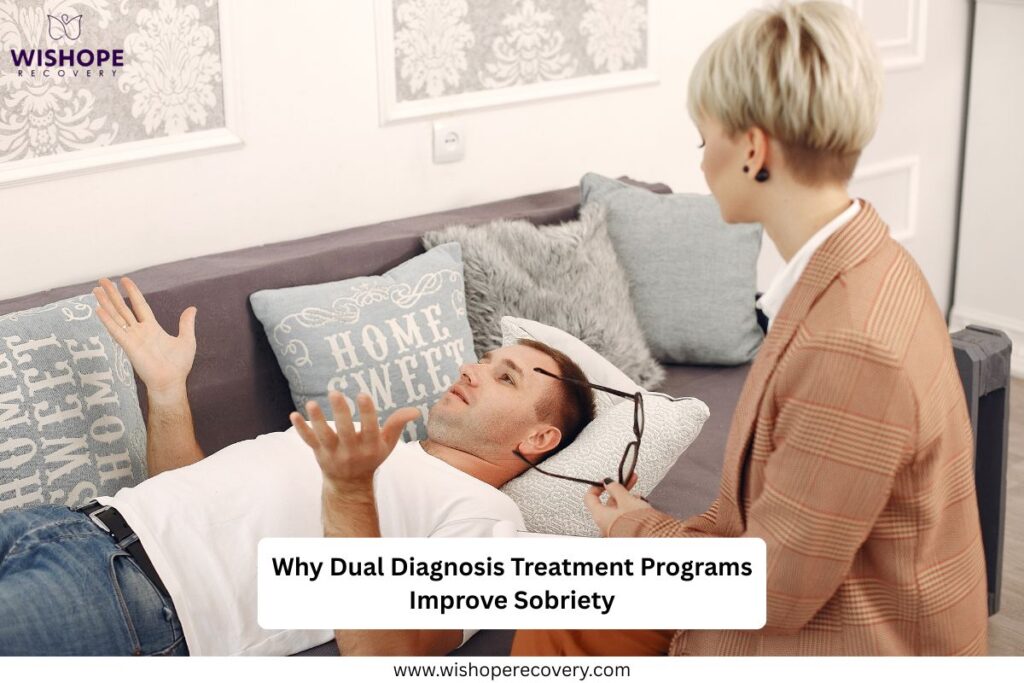At WisHope Recovery, we understand that, with many cases of addiction, there may be some underlying mental health difficulties as well. This is called dual diagnosis or co-occurring disorder, and both must be treated together for attaining long-term recovery. Dual diagnosis treatment programs thus play a critical role in improving sobriety outcomes.
The Relation Between Mental Health and Addiction
Addiction hardly ever exists alone. Depression, anxiety, PTSD, and other mental ailments might exacerbate substance use, and for their part, drug or alcohol abuse would worsen one’s emotional struggles. If only one issue is treated, the other is left to exact its toll — leading to an increased potential for relapse.
A dual diagnosis treatment program cares for both conditions simultaneously. Thus, they provide their clients therapy, medication management, and coping strategies dealing with the root course of addiction instead of its manifestations.
Advantages of Dual Diagnosis Treatment Programs for Sobriety
- Holistic Care – Integrating mental health therapy with substance abuse treatment equips patients with the abilities to counteract both issues.
- Preventing Relapse: Reducing the triggers that promote substance use is achieved by stabilizing mental health symptoms.
- Custom Programs: Specific programs are developed for each client using the individual issues they face as a guide to establish appropriate dual diagnosis inpatient and outpatient treatment plans.
- Improved Coping Skills: Sobriety becomes more ingrained because the client is learning other ways to cope with stress, emotions, and the challenges in their life.

Choosing the Correct Dual Diagnosis Setting
WisHope Recovery offers varying levels of care to ensure that each client can be treated in a manner that best suits their needs and lifestyle.
- Dual Diagnosis Residential Treatment: An inpatient program that provides intensive therapy, medical care, and safety while healing for those needing structured care with 24-hour care.
- Residential Dual Diagnosis Treatment – Combining structured and less structured activities in a home-like setting, perfect for those who benefit from community-based recovery programs on a rather full-time basis.
- Outpatient Dual Diagnosis Treatment provides flexible treatment so clients could continue working, studying, or caring for family members while heading into therapy.
Have you been searching for any dual diagnosis centers near me? At WisHope Recovery, we stand ready to provide you with tailored, evidence-supported programs.
Why This Approach Improves Sobriety
Sobriety goes beyond just staying away from substances — it’s about living a stable, fulfilled life. When mental health and addiction are integrated:
- Triggers are handled more appropriately
- Emotional balanced helps support positive decision-making
- Therapy and family involvement promote building the support network
- Clients develop confidence in coping with life sans substance intake
When compared to treating addiction and mental health issues independently, research consistently demonstrates that integrated dual diagnosis treatment programs produce better long-term recovery outcomes.
Start Your Road to Recovery Now
WisHope Recovery provides professional, caring care aimed at assisting you or a loved one who is struggling with addiction and mental health issues. We have the knowledge and resources you require, whether you require residential dual diagnosis treatment, an outpatient dual diagnosis treatment plan, or are looking for the best dual diagnosis programs in your area.
To find out how our integrated approach can help you achieve long-lasting sobriety, get in touch with WisHope Recovery center right now.

